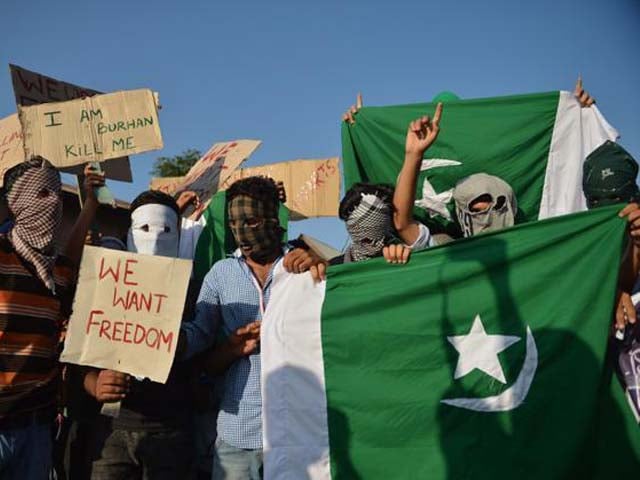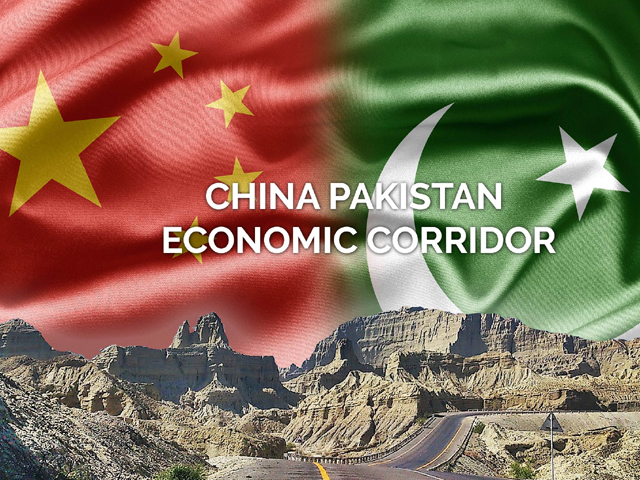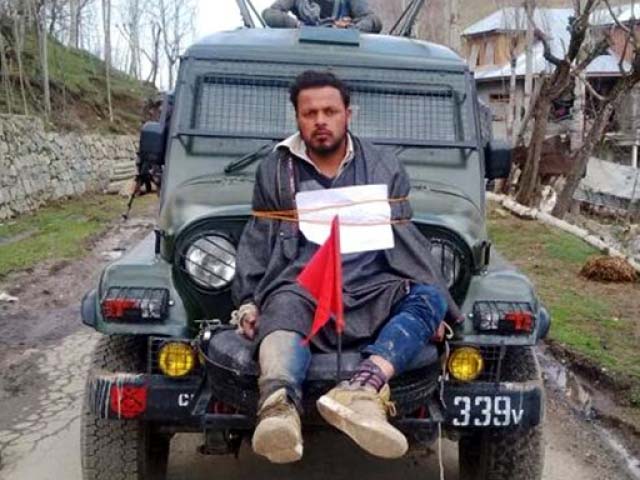
Indian media’s ‘lack’ of Kashmir and Pakistan’s geographical understanding
"The elections in G-B on June 8, are an attempt by Pakistan to camouflage its illegal occupation of the regions."
In the words of one very well-meaning Kashmiri journalist, the Bharatiya Janata Party (BJP)-led New Delhi government and largely jingoist Indian electronic media have made anti-India resistance in restive Jammu and Kashmir much easier than before.
What he meant was that now one only needs to wave a Pakistani flag for a brief moment in any part of Jammu and Kashmir to irritate the Indian government and irk its electronic media. It has become so easy to get them worked up.
And once you infuriate them, the right-wing politicians issue strong-worded statements against “pro-Pakistan elements” within Kashmir and the electronic media follows suit by conducting fiery prime-time television debates on the controversy.
This way, Kashmir gets the much-needed media attention it aspires for.
Without any major investment, almost for free.
Coming to the larger issue, the Indian state has strongly objected to holding of elections in disputed Gilgit-Baltistan, because India lays claim over the whole of erstwhile Jammu and Kashmir which existed at the time of India-Pakistan partition in 1947.
The official Indian claim is that a part of Kashmir, which is under Pakistan’s administration or ‘occupation’, whatever you may call it, belongs to India. Pakistan, on its part, conveniently calls the part under its administration as ‘Azad Kashmir’ while India refers to the part of Kashmir, under its supervision, as ‘integral part’.
India also believes, officially, that conducting elections in Gilgit-Baltistan, which forms a part of Pakistan-administered Kashmir (PaK), is an attempt to “camouflage the forcible and illegal occupation” of the region.
Official spokesperson of Ministry of India’s External Affairs, Vikas Swarup, told journalists last Tuesday that,
“The entire state of Jammu and Kashmir, which includes the regions of Gilgit-Baltistan, is an integral part of India. The elections in Gilgit-Baltistan on June 8, under the so-called Gilgit-Baltistan Empowerment and Self-Government Order, are an attempt by Pakistan to camouflage its forcible and illegal occupation of the regions. We are concerned by the continued efforts by Pakistan to deny the people of the region their political rights and the efforts being made to absorb these territories.”
Vikas Swarup’s statement raises many legitimate questions that one must ask.
What about granting political rights to the people of Jammu and Kashmir under India’s administration? And by questioning the elections in either PaK or Gilgit-Baltistan, India is also raising doubts about the “democratic exercise of election processes” in Jammu and Kashmir as well.
Thus, India’s official stance and flawed arguments render entire Jammu and Kashmir as a disputed territory.
Both houses of the Indian Parliament unanimously adopted a resolution on February 22, 1994, staking claim on erstwhile Jammu and Kashmir and urging Pakistan to vacate parts of the region under its “occupation”.
The said resolution besides many other things declared that,
“a) The state of Jammu and Kashmir has been, is and shall be an integral part of India and any attempts to separate it from the rest of the country will be resisted by all necessary means;
b) India has the will and capacity to firmly counter all designs against its unity, sovereignty and territorial integrity.”
However, it was India’s first prime minister, Pandit Jawaharlal Nehru, who, in a historic broadcast from New Delhi on November 2, 1948, said,
“We have declared that the fate of Kashmir is ultimately to be decided by the people. That pledge we have given, and the Maharaja (Hari Singh, then autocratic ruler of Jammu and Kashmir) has supported it, not only to the people of Kashmir but to the world. We will not, and cannot back out of it. We are prepared when peace and law and order have been established to have a referendum held under international auspices like the United Nations. We want it to be a fair and just reference to the people, and we shall accept their verdict. I can imagine no fairer and juster offer.”
The recent revisionist history also counters India’s claim that ‘Pakistan is the first aggressor’, as the Australian author Christopher Snedden offers a new perspective regarding ‘who actually started the dispute over the international status of Jammu and Kashmir (J&K)’ in his book, ‘Kashmir: The Unwritten History’.
India has not fulfilled her pledge and promise till date.
The Indian counter argument to the plebiscite could be that Kashmir’s then towering political figure, Sheikh Mohammad Abdullah, signed an accord with India’s then prime minister, Indira Gandhi, in 1975. And that the matter should end there.
But it doesn’t stop there because India conveniently forgets the post-1975 historical events.
A popular anti-India armed uprising, fully backed by the local population, erupted in 1989 to challenge India’s rule in Kashmir after all political and democratic options had been literally “exhausted” by the local populace. The armed rebellion happened only two years after the most-rigged assembly elections of 1987.
Keeping in view Kashmir’s present and past and all historical facts, it is absurd to ask the 86-year old Kashmiri leader Syed Ali Shah Geelani that he “should go to Pakistan if he feels J&K is an occupied territory” and thinks of himself as “a ‘Qaidi’ (prisoner) in Kashmir”.
What kind of argument is this?
Why would someone born and brought up in Kashmir be asked to go to Pakistan?
His attaining or not attaining a passport is a non-issue. It is not for the first time that Geelani has applied for a passport. Earlier he has travelled to Makkah to perform Hajj and also wanted to travel to the United States for kidney treatment but was denied visa by the US authorities. This time he intends to visit his ailing daughter in Saudi Arabia.
One could also argue that this time around, Geelani could have easily avoided the passport controversy, but then Kashmir remains a dispute with or without Geelani’s passport.
But then pre-independence Indian leaders, including Mohandas Karamchand Gandhi, fighting British imperialism have travelled abroad, South Africa, Germany and the United Kingdom, on British passports?
Obtaining a travel document doesn’t mean surrendering one’s political ideology and opinion!
It is not only the pro-freedom factions of the Hurriyat Conference or pro-independence Jammu and Kashmir Liberation Front (JKLF) which challenge India’s rule in Kashmir, even the pro-India politicians like Engineer Sheikh Abdul Rashid talk about “defeating colonial designs of the Indian state in Jammu and Kashmir.”
Independent MLA from Langate, Kashmir Rashid on Sunday unfurled the state flag of Jammu and Kashmir for the second time after he had done the same last year on June 7 at Sher-e-Kashmir Park in Srinagar.
MLA Rashid said that Jammu and Kashmir got the state flag after the 1952 Delhi Agreement.
“Our flag represents our sentiments.”
Amid cheers from his supporters Kashmir’s national anthem, written by the late Moulana Masoodi, was also played on the occasion, as the maverick leader demanded that June 7 be declared the Jammu and Kashmir state flag day.
It is in Indian media’s own interest to stop the rhetoric over Kashmir and make sincere attempts to understand Kashmir’s political history and proper context.




COMMENTS (72)
Comments are moderated and generally will be posted if they are on-topic and not abusive.
For more information, please see our Comments FAQ